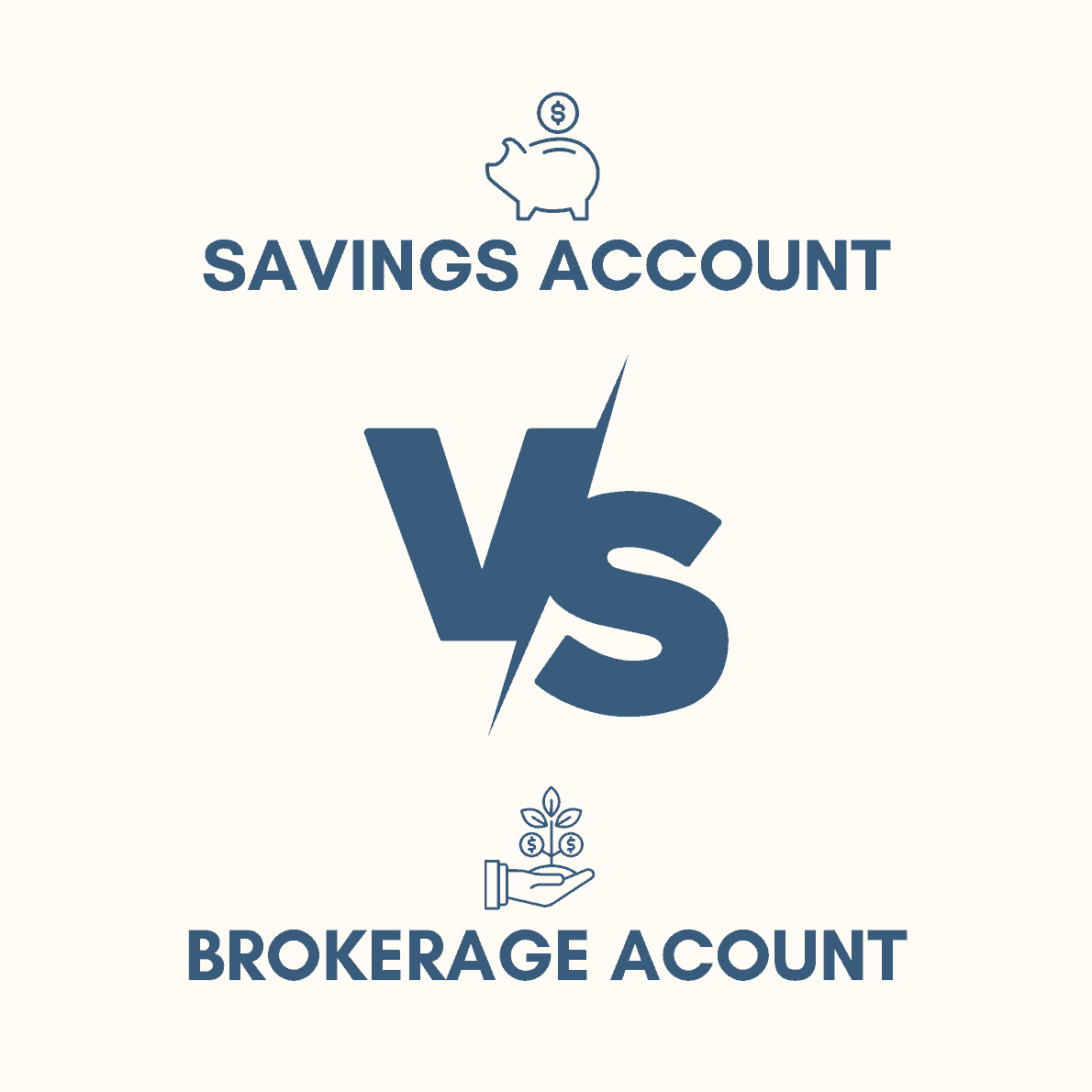
Let’s look at a savings account vs. brokerage account. When it comes to your finances, there are a lot of important decisions to make. Do you want to save your money, or do you want to invest it? What’s the difference between a savings account and brokerage account? In this blog post, we will compare the two and show you the financial difference at the end of 10, 20, 30, and 40 years. We will also look at monthly investment amounts of $200, $500, and $1000. So, which is right for you – a savings account or brokerage account?
What is a Savings Account?
A savings account is a type of deposit account that typically earns interest. The money you deposit into a savings account is meant to be saved, not spent. This is why savings accounts usually have withdrawal limits and monthly fees if you exceed those limits. Savings accounts are FDIC insured, which means your money is backed by the government up to $250,000.
What is a Brokerage Account?
A brokerage account is an account that allows you to buy and sell stocks, bonds, mutual funds, and other investments. When you open a brokerage account, you will work with a broker who will help you choose which investments to make. Your money is not FDIC insured when it is in a brokerage account, but it is still backed by the Securities Investor Protection Corporation (SIPC) up to $500,000.
Note: Savings accounts usually compound their interest monthly. Brokerage accounts will compound interest at varying intervals, so for the following examples, we are compounding brokerage account numbers at a quarterly interval.
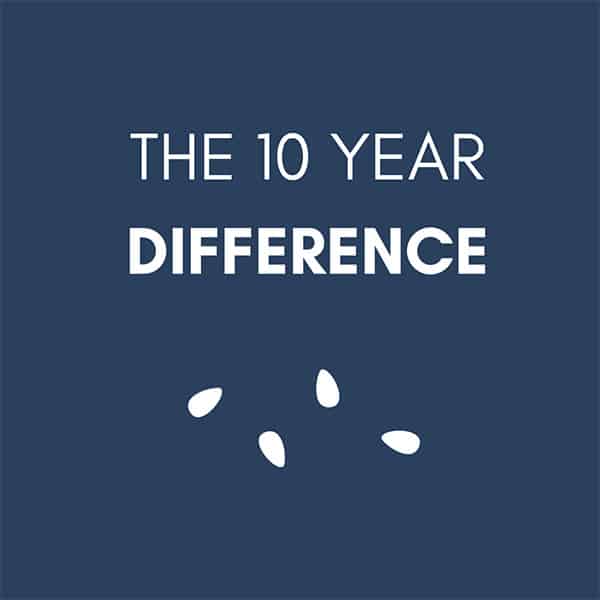
The Financial Difference After Ten (10) Years
Now that we know the difference between a savings account vs. brokerage account, let’s look at the financial difference at the end of ten years based on different contribution levels each month.
$200 Per Month After Ten Years
In a savings account that returns 2.0% (which is very high for a savings account), if you contributed $200 per month, at the end of 10 years you would have, $26,544.
In an investment account that returns 10% on average, if you contributed $200 per month, at the end of 10 years you would have, $40,442.
The difference after ten years – $13,898.
$500 Per Month After Ten Years
In a savings account that returns 2.0% (which is very high for a savings account), if you contributed $500 per month, at the end of 10 years you would have, $66,360.
In an investment account that returns 10% on average, if you contributed $500 per month, at the end of 10 years you would have, $101,104.
The difference after ten years – $34,744.
$1000 Per Month After Ten Years
In a savings account that returns 2.0% (which is very high for a savings account), if you contributed $1000 per month, at the end of 10 years you would have, $132,720.
In an investment account that returns 10% on average, if you contributed $1000 per month, at the end of 10 years you would have, $202,207.
The difference after ten years – $69,487.
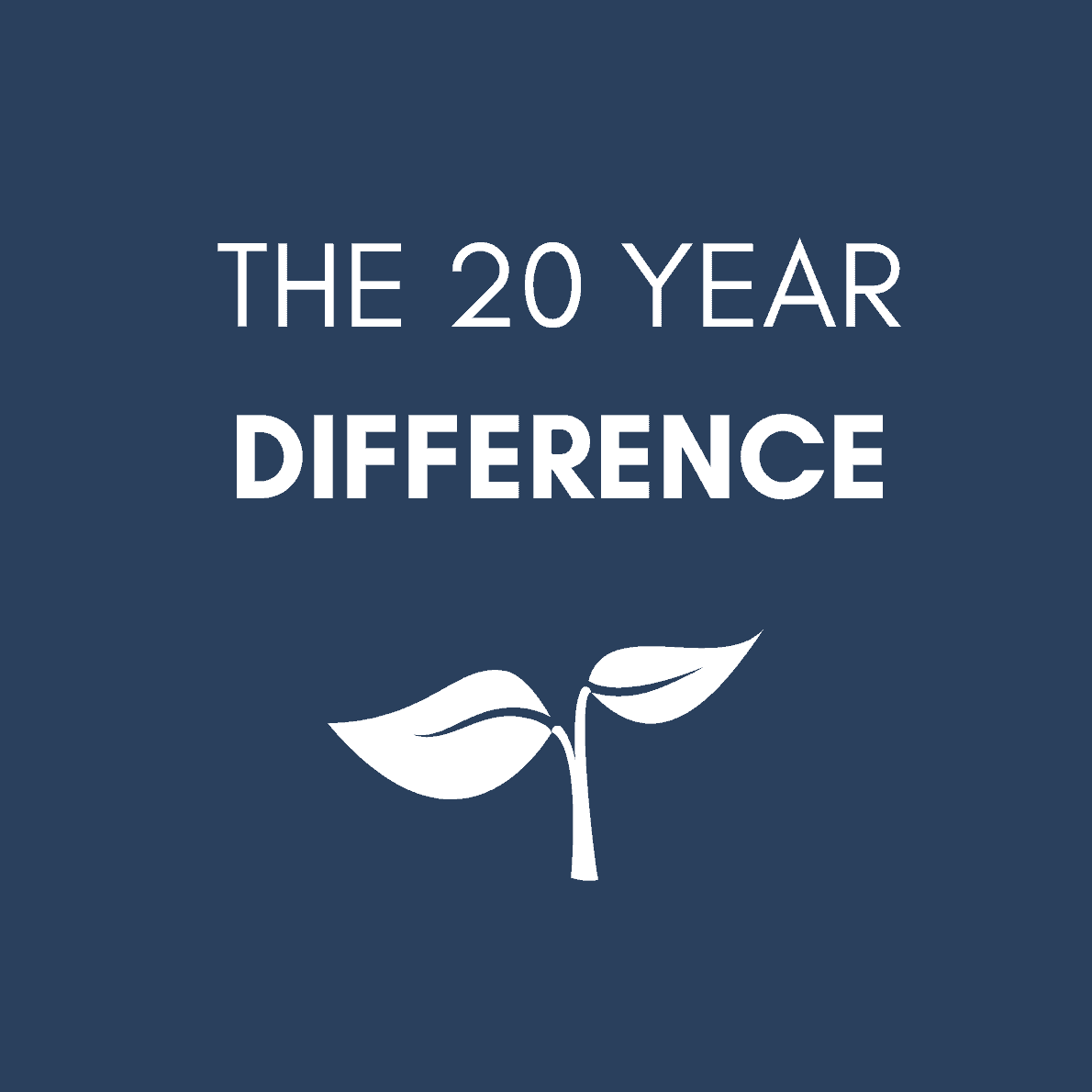
The Financial Difference After Twenty (20) Years
I know you might be thinking that you can just double the difference of ten years in order to see the difference over twenty years, but this is where you really begin to see compound interest at work. Let’s jump in!
$200 Per Month After Twenty Years
In a savings account that returns 2.0% (which is very high for a savings account), if you contributed $200 per month, at the end of 20 years you would have, $58,959.
In an investment account that returns 10% on average, if you contributed $200 per month, at the end of 20 years you would have, $149,030.
The difference after twenty years – $90,071.
$500 Per Month After Twenty Years
In a savings account that returns 2.0% (which is very high for a savings account), if you contributed $500 per month, at the end of 20 years you would have, $147,398.
In an investment account that returns 10% on average, if you contributed $500 per month, at the end of 20 years you would have, $372,574.
The difference after twenty years – $225,176.
$1000 Per Month After Twenty Years
In a savings account that returns 2.0% (which is very high for a savings account), if you contributed $1000 per month, at the end of 20 years you would have, $294,797.
In an investment account that returns 10% on average, if you contributed $1000 per month, at the end of 20 years you would have, $745,148.
The difference after twenty years – $450,351.
CHECK OUT THIS VIDEO WHERE I WILL WALK YOU THROUGH THE STEPS OF OPENING AN INVESTMENT ACCOUNT. THERE IS NOTHING TO FEAR! GET STARTED TODAY!
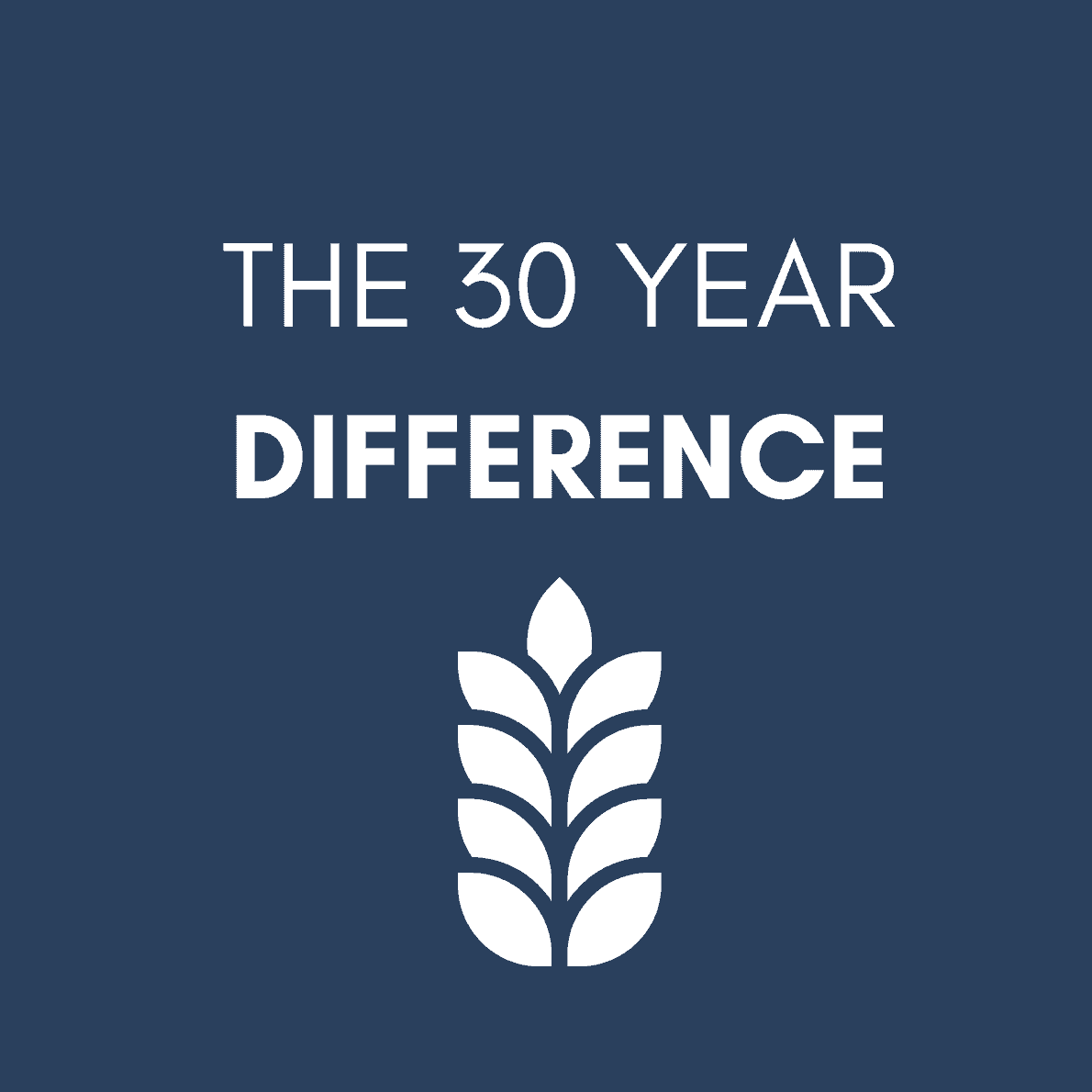
The Financial Difference After Thirty (30) Years
If you thought that the jump in difference was big at twenty years, thirty years might just blow your mind. This is why it is so important to know the difference in a savings account vs. brokerage account. Check it out!
$200 Per Month After Thirty Years
In a savings account that returns 2.0% (which is very high for a savings account), if you contributed $200 per month, at the end of 30 years you would have, $98,545.
In an investment account that returns 10% on average, if you contributed $200 per month, at the end of 30 years you would have, $440,595.
The difference after thirty years – $342,050.
$500 Per Month After Thirty Years
In a savings account that returns 2.0% (which is very high for a savings account), if you contributed $500 per month, at the end of 30 years you would have, $246,363.
In an investment account that returns 10% on average, if you contributed $500 per month, at the end of 30 years you would have, $1,101,489.
The difference after thirty years – $855,126.
$1000 Per Month After Thirty Years
In a savings account that returns 2.0% (which is very high for a savings account), if you contributed $1000 per month, at the end of 30 years you would have, $492,725.
In an investment account that returns 10% on average, if you contributed $1000 per month, at the end of 30 years you would have, $2,202,978.
The difference after thirty years – $1,710,253.
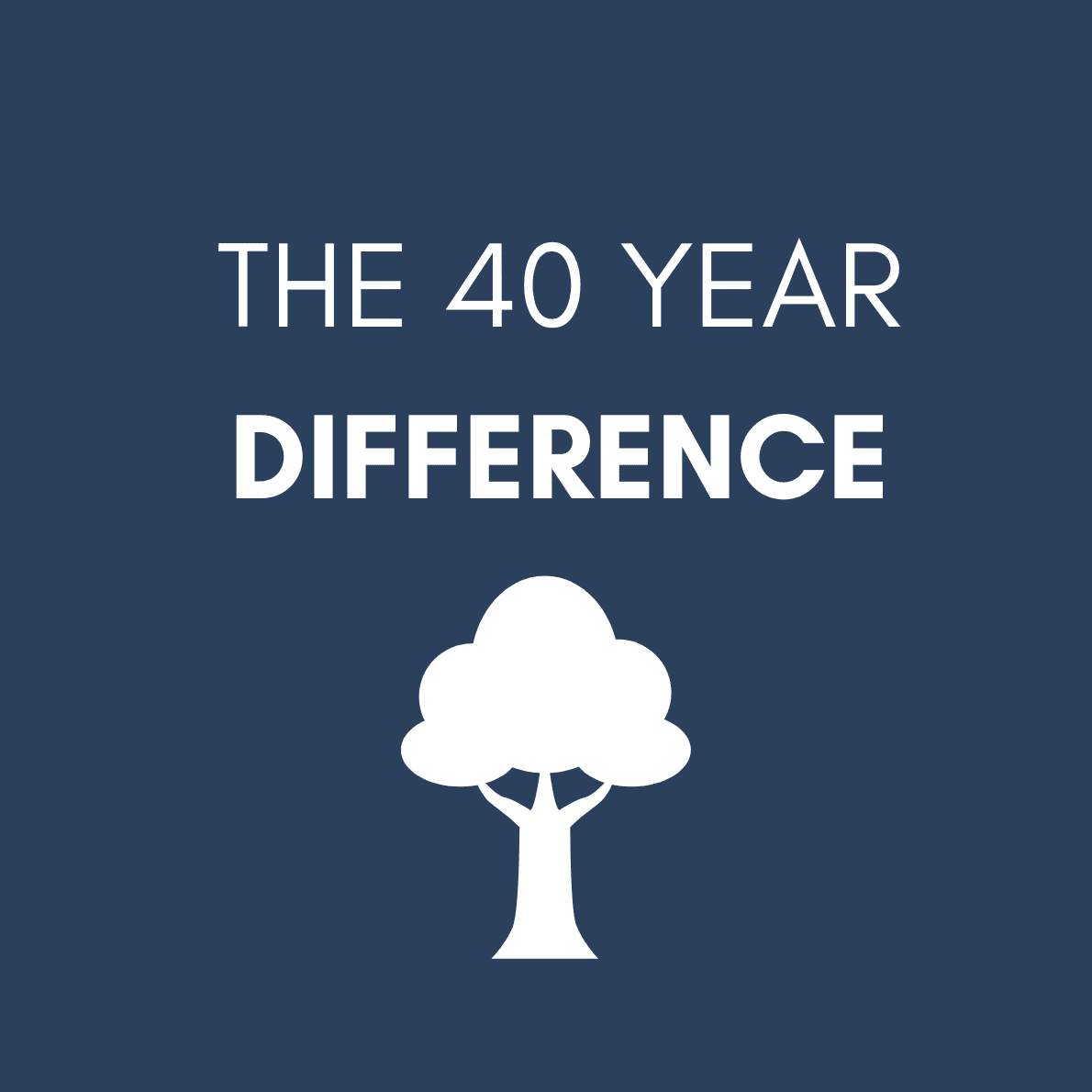
The Financial Difference After Forty (40) Years
As you can imagine by now, the difference in the forty year returns is going to be pretty massive. Have a look! I really hope this motivates you to consider investing for the long-term!
$200 Per Month After Forty Years
In a savings account that returns 2.0% (which is very high for a savings account), if you contributed $200 per month, at the end of 40 years you would have, $146,887.
In an investment account that returns 10% on average, if you contributed $200 per month, at the end of 40 years you would have, $1,223,469.
The difference after forty years – $1,076,582.
$500 Per Month After Forty Years
In a savings account that returns 2.0% (which is very high for a savings account), if you contributed $500 per month, at the end of 40 years you would have, $367,218.
In an investment account that returns 10% on average, if you contributed $500 per month, at the end of 40 years you would have, $3,058,672.
The difference after forty years – $2,691,454.
$1000 Per Month After Forty Years
In a savings account that returns 2.0% (which is very high for a savings account), if you contributed $1000 per month, at the end of 40 years you would have, $734,435.
In an investment account that returns 10% on average, if you contributed $1000 per month, at the end of 40 years you would have, $6,117,344.
The difference after forty years – $5,382,909.
More About Savings Accounts
Advantages of a Savings Account
There are several advantages of a savings account.
Some of the main advantages include:
– Savings accounts are FDIC insured, meaning your money is backed by the government up to $250,000.
– With a savings account, you don’t have to worry about market fluctuations because your money is not invested in the stock market. However, that doesn’t mean that your interest rate will always be the same.
Disadvantages of a Savings Account
While there are several advantages to having a savings account, there are also some disadvantages that you should be aware of. Some of the main disadvantages include:
– The interest rates on savings accounts are very low, especially when compared to other investment options.
– You may be tempted to spend the money in your savings
What should I use a savings account for?
– An emergency fund: This is the most important use for a savings account. You should have at least three to six months of living expenses saved. This will cover you in case of an unexpected job loss or medical emergency.
– A down payment on a house or car: If you’re planning on making a large purchase, it’s helpful to have the money available in a savings account.
More About Brokerage Accounts
Advantages of a Brokerage Account
A brokerage account is an investment account that allows you to buy and sell stocks, bonds, mutual funds, and other investments.
Some of the main advantages of a brokerage account include:
– With a brokerage account, you have the potential to make more money than you would with a savings account because your money is invested.
– A brokerage account also gives you the ability to grow your money tax-free with a Roth IRA.
– With a brokerage account, you have more control over what happens to your money. For example, if you don’t want to invest in stocks, you can choose to invest in bonds or mutual funds instead.
Disadvantages of a Brokerage Account
While there are several advantages to having a brokerage account, there are also some disadvantages that you should be aware of. Some of the main disadvantages include:
– With a brokerage account, you have the potential to lose money if the stock market goes down.
– You may need to pay taxes on your investments if you sell them for a profit.
– You may need to pay fees to a financial advisor if you use one. However, using a financial advisor is not necessary.
– Depending on the type of brokerage account, you may have to pay hefty fees if you withdrawal funds before retirement age.
What should I use a brokerage account for?
– Investing for the long term: When you invest in stocks, you’re buying a piece of a company that you hope will be worth more in the future. If you’re investing for retirement, you’ll want to invest in stocks so that your money can grow over time.
The Bottom Line – Savings Account vs Brokerage Account
When we look at a savings account vs. brokerage account, as you can see, there are both advantages and disadvantages to savings accounts and brokerage accounts. It’s important to understand the difference between the two before you decide where to put your money.
If you’re looking for a safe place to park your cash, a savings account is a good option. However, if you’re looking to grow your money over time, you’ll need to invest in a brokerage account.
No matter what you decide, be sure to do your research and understand the risks involved before making any decisions with your money. There is no guarantee what a return from a brokerage account will be. It all depends on what you choose to invest in, and how the market is impacted by many varying factors. What we can do is look at the history of the market. Even though there have been bumpy years, the person who invests consistently over time, generally comes out way ahead.
If you’re interested in opening an investment account, I use Charles Schwab for my personal investments. You can follow this link to sign up and follow along with my video above for step-by-step instructions.





0 Comments